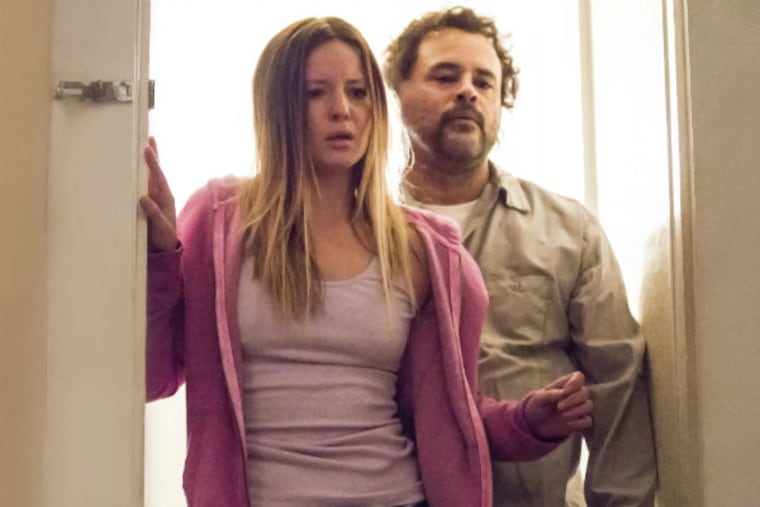Why is Lifetime so obsessed with women getting kidnapped?
Click to Lifetime in May and it's more than likely you'll run across yet another abduction story - disturbing tele-movies about women who are kidnapped, tortured, and raped for weeks, months, even years.

Click to Lifetime in May and it's more than likely you'll run across yet another abduction story - disturbing tele-movies about women who are kidnapped, tortured, and raped for weeks, months, even years.
This month will see the premieres of three: Cleveland Abduction (8 p.m. Saturday), Stockholm, Pennsylvania (8 p.m. May 9), and Kidnapped: The Hannah Anderson Story (8 p.m. May 23).
Cleveland Abduction is the most brutal. It tells the true story of the three women - Michelle Knight, 21 when taken, Amanda Berry, 16, and Gina DeJesus, 14 - held in captivity for more than a decade by Ohio school bus driver Ariel Castro.
A formulaic drama starring Orange Is the New Black's Taryn Manning as Knight, the film tries not to over-sensationalize the material, but still features several scenes of almost unbearable barbarity.
The final act is noteworthy: Instead of ending with the women's rescue, the story stays with Knight and depicts the transformation she undergoes during the first weeks of her reentry into normal life.
Cleveland Abduction's debut coincides with the second anniversary of the victims' rescue on May 6, 2013. The anniversary will also be marked by the release of Knight's memoir, Finding Me: A Decade of Darkness, a Life Reclaimed: A Memoir of the Cleveland Kidnappings.
The book, which served as a primary source for the film, already is at No. 33 on Amazon's best-seller list, No. 8 for memoirs.
Knight's story is an example of how abduction stories are more popular than ever - Jaycee Dugard, Elizabeth Smart, Hannah Anderson, Carlina White, Anne Sluti all have had their stories told in print and on the screen.
Lifetime, which was launched in 1984, is a major purveyor of the abduction story. A cursory search yields a dozen such films in the last five years, including one of the channel's biggest hits, Abducted: The Carlina White Story, in addition to such titles as Taken in Broad Daylight and Taken Back: Finding Haley .
These yarns take us into dark worlds ruled over by sexual predators who systematically dehumanize, torture, and rape their victims. They would make the most jaded person wince in pain.
Power of the spirit
There is nothing new about stories such as Stockholm, Pennsylvania, a fictional account of a 16-year-old girl (Saoirse Ronan) who returns home after 12 years with her kidnapper.
The film is part of a peculiarly American storytelling tradition.
"The captivity narrative is one of the earliest American literary genres, and historically they have always been very popular," said Megan Goodwin, who teaches religious studies at Bates College.
The genre goes back as far as the Puritans and includes the 1682 memoir The Sovereignty and Goodness of God by New Englander Mary Rowlandson, chronicling the time she spent as a captive of various Native American tribes.
Two centuries later, the bulk of the stories were about Catholics or Mormons who had abducted Protestant women, said Goodwin, whose dissertation is a study of contemporary captivity stories.
Rowlandson's book is deeply religious, as are the memoirs published by Knight and Smart (My Story). Both women view their ordeal as a test of the spirit. Refusing to label themselves victims, they speak of being survivors who have emerged, to use a Knight's metaphor, from a chrysalis of suffering as strong, more aware, more grounded. Both have been inspired to help other victims of sexual violence.
These memoirs are ways for the women to reclaim their voice, their identity after it had been taken by their abductors.
While the bulk of the stories are about girls and women who are sexually abused by their captors, in films such as Stockholm, Pennsylvania and Abducted: The Carlina White Story kidnappers take kids so they can raise them as their own.
Stockholm, Pennsylvania, which had its debut at the Sundance Film Festival before Lifetime acquired it, is by far the most sophisticated of the three.
Ronan plays a 16-year-old who has lived since the age of 4 under the care of her kidnapper, a man (Jason Isaacs) she thought of as her real guardian and friend. Entirely cut off from the outside world, but treated with care and respect, she comes to miss him once he is arrested.
In a reversal of generic norms, the teen feels alienated from her biological parents and feels she's a prisoner in their house.
The politics of gender
Surely there are better ways to attest to the power of the human spirit than The Hannah Anderson Story, a lurid, fact-based story about a California teenager (Jessica Amlee ) who was kidnapped by her father's best friend after he tortured her 8-year-old brother, their mother, and the family dog.
A boilerplate melodrama featuring a weak script and humdrum performances, the movie is noteworthy because it focuses on one of the most troubling aspects of contemporary abduction cases - the media frenzy. Set immediately after the teen's seven-day ordeal, the movie examines how the victim was made to suffer by unfounded rumors that she participated in murdering her family.
Despite their differences, these films share one important characteristic: Their excessive, Gothic presentation of the suffering men can inflict on women.
Viewers, almost exclusively women, seem drawn to them because these films express their everyday fear of being victimized in such an extreme way, they serve as a paradoxical form of comfort - this could never happen to me.
215-854-2736